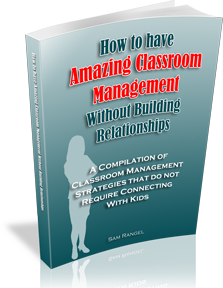
This is the fourth installment of the Nail Your Interview for a Teaching Position series.
To recap, I’m an Assistant Principal at a middle school, and part of my job is hiring new teachers. I take this responsibility very seriously, since every teacher on my staff has an effect on the quality of education my students receive.
Recently, I had the opportunity to be on a panel interviewing for a couple of open teaching positions at my school, and I was a little surprised at how many of the candidates were unprepared for the interview.
That is why I decided to write this series of posts. I want to help prospective teachers be better prepared for the interview. It also serves to remind all teachers of the qualities that they need to have to be successful.
The first Nail in the series, Focus on Building Positive Relationships, can be found here.
The second Nail, Know Your Common Core, is here.
The third Nail, Creativity in Lesson Planning, can be found here.
The fourth Nail in our series is:
Have a Strategy for Parent Communication.
There will definitely be a question on involving parents in your interview. It’s important that you create a strategy in which you will communicate consistently with parents.
Here are some ideas:
- Update your grades often. Many schools have an online grading program where parents can see their child’s progress from their computer or smart phone. Make sure you are posting grades at least every two weeks. If there is no online access to grades for parents, make sure you send home progress reports with the students. Most parents want to participate in their child’s education.
- Check grades often. Identify those students who are falling behind early, and contact parents. Make the phone call. Use email as a back-up.
- Invite parents to sign up for Remind.com. This is a free service that will send a text to the parents who are enrolled alerting them to upcoming projects, tests, etc.
- Make positive phone calls home. Most parents are used to getting phone calls from the teacher that are negative. Do your best to make as many positive phone calls. I know there is not a lot of time left over in a teacher’s day to make these calls, but they are valuable communication tools.
- Give parents your email address and check your email often. On your First Day Letter (the letter you send home with students on the first day of school with your syllabus), make sure you include your email address, so parents can contact you if they have a questions. Reply to all emails as soon as possible. Do not let a parent’s email go unanswered for more than a couple of hours. Most parents won’t abuse email. (Notice I said “Most parents.”)
- Get the email addresses from the parents of your students. This is so important. Many email addresses in the school’s database are outdated or just incorrect. Create a form that you send home with students that asks for the current email address of the parent or guardian. When the phone call goes to voicemail, you can follow up with an email address, and you can be pretty confident that your message with get through.
- Have a strategy for communicating with parents who don’t speak English. In fact, this is a good question to ask the panel. What resources does the school have to help teachers communicate to parents who speak another language? Most districts will have a department where you can have your letters home translated into other languages. You want to be able to involve ALL parents in the education of your students.
- Another idea is to have a Homework Blog where you post what is for homework on a daily basis. Either you can update it daily (which might be tough) or you can have a student do it. I wrote a blog post about it a few years ago. Check it out here.
You want to demonstrate with your answer that you are not afraid of contacting parents. You want to make sure that the members of the interview panel know that you believe parent communication is an essential element of student success and that partnering with parents is a priority in your educational strategy. That was a long sentence.
So there you have it, the fourth Nail in your preparation for your interview: Have a Strategy for Parent Communication.
I hope you’re finding these posts helpful. If so, please share them on Twitter or on Facebook. That would be cool.
Follow me on Twitter or like my Facebook page, so you get notified when I upload Nail #5.
Until next time, here’s to your Success in the Classroom!
Thank you,
Sam



